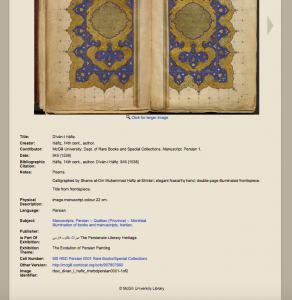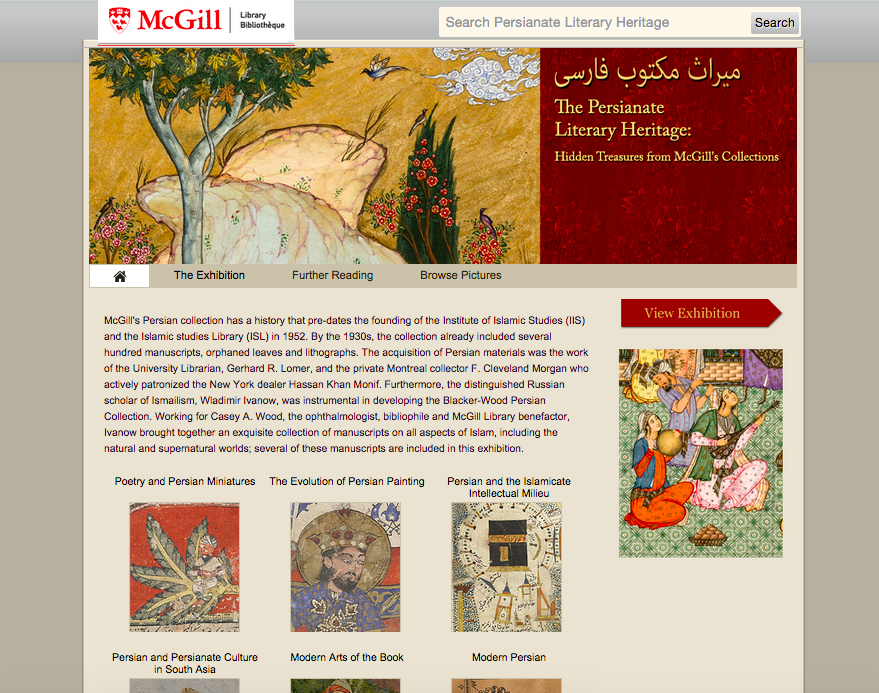During the winter 2015 term, McGill Library & Archives welcomed several practicum students from the McGill School of Information Studies (SIS). The SIS website outlines the practicum experience as
a 3 credit academic elective course in which master’s-level students participate in field practice under the guidance of site supervisors. Students benefit from the opportunity to apply their theoretical knowledge base and learning in a real-world setting, while gaining experience and practicing professional skills. Site supervisors and their workplaces benefit from the energy, knowledge, and skills of an emerging information professional while providing students with a valuable mentorship experience in a real-world setting.
Library Matters took a practicum pause with these students to talk about their work at the McGill Library & Archives and how their experience may help to inform Library units as they move forward with related projects. This interview features Daniel Míguez de Luca. Daniels’s practicum work involved supporting the conversion of a physical exhibition to digital form and was done in collaboration with three departmental branches/units: Islamic Studies Library, Collection Services, and Digital Initiatives.
Library Matters (LM): Can you tell LM readers about your practicum?
Daniel Míguez de Luca (DMdL): My practicum was a multidisciplinary experience where I followed the workflow of turning a physical exhibition into a digital one. The exhibition, The Persianate Literary Heritage, contained 34 items from McGill’s Rare Books and Special Collections department and Islamic Studies Library.
I was able to work with three great professionals – Sean Swanick, Sarah Severson, and Megan Chellew. With Sean, I learned about Persian literature and history, as well as how to be a liaison librarian with a specific subject specialization. Together, we dismantled the exhibit that was in the McLennan lobby – handling Persian and Indian manuscripts from the Islamic Studies Library that were from as early as the 16th and 17th century – and which were absolutely beautiful.
I then worked with Sarah, in Digital Initiatives, which was completely different. There, I worked with digitization equipment and helped ensure that the digitized information was stored properly and would be easy to access.

The Persianate Literary Heritage digital exhibit, item metadata listing. Image provided by Daniel Míguez de Luca
Later in the practicum, I worked with Megan to oversee cataloguing and metadata issues and to determine which information about each item would be brought to the digital exhibit site. This work with Megan was enlightening, because although metadata can be intimidating at times, it is really important for finding and describing all these items. Going through the process step-by-step with Megan was a wonderful experience.
LM: Did the team have to pick and chose which item to digitize?
DMdL: Luckily, every item in the exhibit was digitized. There were only thirty-four items, however some digital collections are much larger and more time-consuming to create. The final goal is always to make sure that the physical collection or exhibit is accurately represented digitally, and that means digitizing as many items as possible. McGill has a rich collection of digitized material and digitization projects are always in progress. There are so many more resources at McGill that only exist in physical form, and more digitization projects like the one I participated in will highlight McGill’s unique holdings.
LM: You were able to do all that within four months?
DMdL: What happened was that I followed the exhibit step by step – from dismantling it to representing it digitally on the site. Although I did not do every step alone, I was able to see every part of the digitization process. It would have been great to work on this project for a year and to invest all my time into each step, of course. The reality is that there isn’t one single professional that has the specialization to do what Sean, Sarah and Megan each do; you need the three different specializations for it to work effectively. This is something that I came out of the practicum seeing clearly; although this project is complicated with a lot of opportunity for miscommunication, you need each professional’s specialization. It would be impossible without the whole team.
LM: Were there any other takeaways?
DMdL: I learned the specifics of each part of the digitization process. I learned a lot about Persian literature, actually. I have a background in music, and I always enjoyed music history classes, so I could have spoken to Sean for hours about the material we were interacting with – there is so much rich history involved. I definitely learned from each practicum supervisor, but I also came away with confidence of having knowledge of what is involved in the digitization process as a whole.
LM: What is something you wish you had known before having started your practicum?
DMdL: To be honest, I wish I hadn’t been nervous at the beginning of the practicum. Although I have worked in a public library setting, I had no experience in an academic setting. I don’t think I needed to be nervous at all – the professional librarians that I have met all want to help students and help each other. Several people asked me if it was complicated having three supervisors, and it was not; if anything it meant that I had three people who were more than willing to sit down with me and give me as much support as I needed.
LM: What do you want to do next? Do you want to continue this type of work?
DMdL: What was so unique about my practicum was that I saw three different professions, in a way. I think that it’s very important to digitize rare items like the ones from the Persianate Literary Heritage exhibit, which up to now were only available by travelling to the library to physically handle them. Now, anyone in the world with a computer has access to the digital exhibit, and that’s exciting. Outreach and making resources available is very exciting too, and I would love to continue working in that domain. As I mentioned, my background is in music, and I would enjoy working with rare music collections to support music scholars and students.

Screen capture, Persianate Literary Heritage digital exhibition. Image provided by Daniel Míguez de Luca
LM: How do you think this practicum works into your career trajectory here at McGill?
DMdL: It was nice way to cap it off. The theory in the Masters of Library and Information Studies is very important. Many, as did I, came into the programme without a clear idea of what the field was. As soon as you start implementing the theory in a practical setting, or seeing a professional librarian using it, it all fits into place. I learned many things from the practicum, but the confidence that I gained through this experience is priceless.
LM: What did you study before coming to the program?
DMdL: I did my undergraduate degree here at McGill, in music – my instrument is the tuba. I still wanted to work in the music community, but I was not sure how. It was an interesting transition from music to information studies. I still wanted to work in the music community, but I was not sure how. I thought libraries play an important role in all faculties and domains so I thought that would suit me better. And now that I’m finished my degree, I know it does.
LM: Are you going to stay in Montreal?
DMdL: This summer, I will be doing a two-month contract at a music center in North Carolina called Brevard. I will be the Assistant Orchestral Librarian for two months. It’s a little different than an academic library environment but I am still working around music. It will be a good way to take in some more experience before coming back to Montreal.













Leave a Reply
You must be logged in to post a comment.